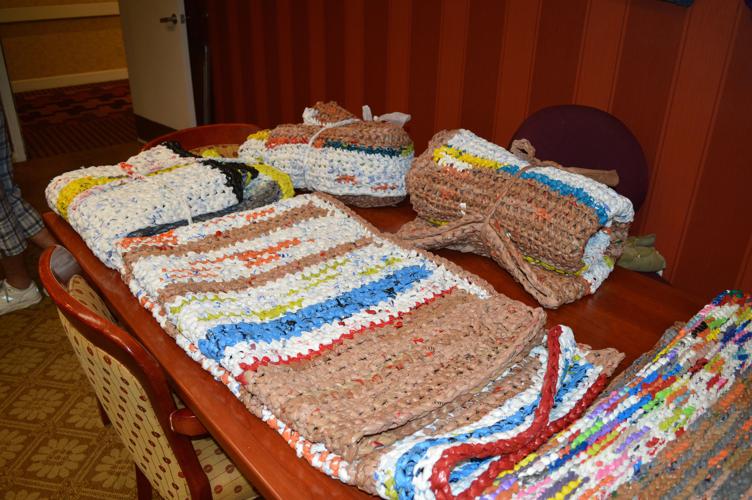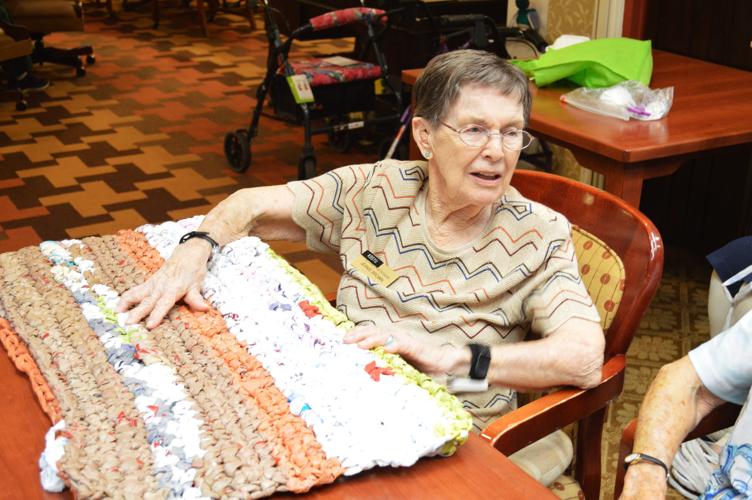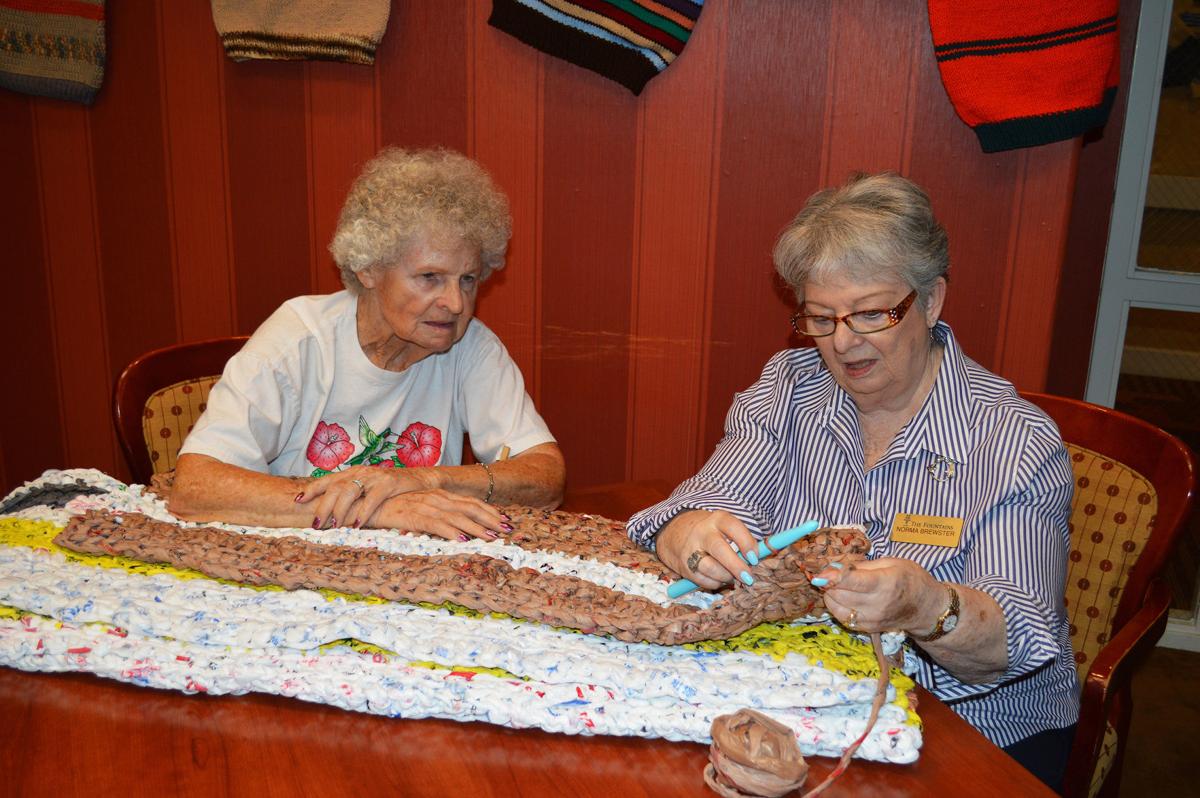Those pesky plastic grocery bags are all over the place. We see them blowing around on the street.
We don’t want to use them, but even if we have cloth bags, we almost never remember them.
The recycling plants don’t want them. They can shut down the machinery, so we can’t put them in curbside recycling.
What if our plastic bags could be used to help the homeless? We might feel better about having forgotten our cloth grocery bags so often.
At The Fountains at La Cholla, there is such a group. It was founded by the late Dwaine Greer, who was a professor of art education at the University of Arizona, and a resident at the retirement community before his death.
This group takes those bags, flattens them, and cuts them into strips. They then join the strips to crochet sleeping mats for people experiencing homelessness.

Jean Brown chats with her friends as she prepares to work on her mat.
The mats are lightweight and easily carried. They can be hosed off when dirty and dry quickly. They keep the sleeper off the hard ground just a bit, and while it isn’t often a problem in Tucson, if the ground is damp, the mats help keep the sleeper dry.
The crocheting team has members who don’t crochet, but they help in other ways. It’s a well-oiled machine made up of friends who work on their own time and then come together for an hour on Saturdays to work together.
Judellen Thornton takes the bags and cuts them into strips.
Jennie Gardner, Betty Schabel and Joyce Willey join the strips into longer strings and roll them into balls of “yarn.” They make each ball a single color.
Then Norma Brewster, Margaret Dorner, Jean Brown, Alice Wilse and others go to work. Wilse is functionally blind but has still managed to crochet seven mats since she joined the group.
It takes a lot of bags to make a sleeping mat at least six feet long and three to four feet wide. They use large crochet hooks to work with this unusual thread.
Using different colors of plastic bags makes it possible to design appealing mats. If your newspaper comes in a colored plastic bag, these people want you to save it for them. If you’re out shopping and get a plastic bag that is a different color than the norm, they want it.

Sleeping mats, made of used plastic bags by a group at a Tucson retirement community, will be handed out via a homeless shelter.
The project has become intergenerational. When Sydney Kurpiewski and Claire Sugiyama, a pair of Girl Scouts, asked if they could sell cookies at The Fountains, not only did they make a killing in the cookie business, they learned that this project could use their help. They spent some time with the team flattening bags and smoothing them out.
The girls suggested that some mats be donated to the Veterans Administration for homeless veterans, which will be done.
Stone estimates at least 500 mats have been donated so far to shelters and organizations that help the homeless, but there will be more. This group has no intention of stopping now.
Homeless benefit from seniors' project to upcycle grocery bags
Homeless benefit from seniors' project to upcycle grocery bags
Updated
Girl scouts Claire Sugiyama, left, and Sydney Kurpiewski help show off a completed mat. The girls have help the team by flattening big batches of grocery bags so they can be cut into strips.
Homeless benefit from seniors' project to upcycle grocery bags
Updated
Alice Wilse, left, gets help finishing off her mat from Norma Brewster. Wilse is functionally blind but is still able to crochet the mats. She just needs a bit of help at the end.
Homeless benefit from seniors' project to upcycle grocery bags
Updated
Norma Brewster works on a mat. The ball at the left of the photo is made of strips of plastic grocery bags tied together in a very specific way so the knot is small enough not to hinder the crochet hook and won't be felt by the person using the mat.
Homeless benefit from seniors' project to upcycle grocery bags
Updated
Jean Brown chats with her friends as she prepares to work on her mat.
Homeless benefit from seniors' project to upcycle grocery bags
Updated
Judellen Thornton, left, cuts the grocery bags into strips for the team. She is sitting with Margaret Dorner who is working on a mat. The strips have to be the same width and have no holes, because that would weaken them.
Homeless benefit from seniors' project to upcycle grocery bags
Updated
Betty Schabel, left, and Jennie Gardner tie the strips of grocery bags together and roll them into balls of "yarn" for the team to use when they crochet the mats.
Homeless benefit from seniors' project to upcycle grocery bags
Updated
Joyce Willey ties bag strips together to make balls of "yarn." Here, she is working on removing a knot that was either too big or caused a loop in the strip.
Homeless benefit from seniors' project to upcycle grocery bags
Updated
Jean Brown works on a mat.
Homeless benefit from seniors' project to upcycle grocery bags
Updated
Homeless benefit from seniors' project to upcycle grocery bags
Updated
A mat in the early stages with a ball of bag strips ready to be crocheted into the mat. The team uses larger hooks like the blue on to the right of the mat to work with this unique material.
Homeless benefit from seniors' project to upcycle grocery bags
Updated
This mat was made by the late Dwaine Greer, who was once a professor of art education and textiles at the University of Arizona. Greer was a resident of The Fountains at La Cholla and started the project of making mats for homeless people out of grocery bags. His mats were quite artistic when he could find bags of various colors.
Homeless benefit from seniors' project to upcycle grocery bags
Updated
This mat was made by the late Dwaine Greer, who was once a professor of art education and textiles at the University of Arizona. Greer was a resident of The Fountains at La Cholla and started the project of making mats for homeless people out of grocery bags. His mats were quite artistic when he could find bags of various colors.
Homeless benefit from seniors' project to upcycle grocery bags
Updated
Some completed mats that will soon be donated via a homeless shelter.
Homeless benefit from seniors' project to upcycle grocery bags
Updated
Alice Wilse shows off her completed mat. It is large enough for a larger person or someone with a pet.
Homeless benefit from seniors' project to upcycle grocery bags
Updated
Sydney Kurpiewski and Claire Sugiyama flatten grocery bags so they are more easily cut into strips. The two girl scouts met the team when they sold cookies at The Fountains. They returned to help with preparation work as one of their projects.
Homeless benefit from seniors' project to upcycle grocery bags
Updated
The sleeping mats are easy to fold or roll up and carry because they are very light weight.







